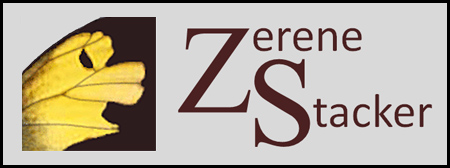Differences
This shows you the differences between two versions of the page.
| Both sides previous revision Previous revision Next revision | Previous revision Next revision Both sides next revision | ||
|
stacker:docs:options:preferences:imagesaving [2015/03/24 17:28] rjlittlefield |
stacker:docs:options:preferences:imagesaving [2020/07/23 21:13] rjlittlefield |
||
|---|---|---|---|
| Line 15: | Line 15: | ||
| The bottom section, titled **Output Image Names**, provides a template that controls how Zerene Stacker names output images as they are generated. | The bottom section, titled **Output Image Names**, provides a template that controls how Zerene Stacker names output images as they are generated. | ||
| - | By default, the template is set to "{datetime} ZS {method}", which produces names like "2011-04-23-15.37.40 ZS PMax". However, you can redefine the template to use any combination of | + | By default, the output naming template is set to "{datetime} ZS {method}", which produces names like "2011-04-23-15.37.40 ZS PMax". However, you can redefine the template to use any combination of certain //{tagnames}// surrounded by curly braces, as follows. |
| + | |||
| + | **Note:** To work properly, the tagnames must be surrounded by curly braces {} and not by ordinary parentheses (). These characters look very much alike in certain fonts, so be sure to type carefully. | ||
| * //{datetime}// date and time (in fixed format: YYYY-MM-DD-hh.mm.ss) | * //{datetime}// date and time (in fixed format: YYYY-MM-DD-hh.mm.ss) | ||
| Line 24: | Line 26: | ||
| * //{mininp}// shortest unique minimum number that appears in the names of source frames used for this output. If the image was constructed from input files named IMG_9713 through IMG_9765, then {mininp} will be "13". The file name extension such as ".JPG" or ".TIF" is always ignored. | * //{mininp}// shortest unique minimum number that appears in the names of source frames used for this output. If the image was constructed from input files named IMG_9713 through IMG_9765, then {mininp} will be "13". The file name extension such as ".JPG" or ".TIF" is always ignored. | ||
| - | * //{mininp://#//}// like {mininp}, except that at most only # characters will be truncated from the full file names. If the image was constructed from input files named IMG_9713 through IMG_9765, then {mininp:2} will be "G_9713" instead of just "13". {mininp:0} will be the entire name of the first file, "IMG_9713". | + | * //{mininp://#//}// like {mininp}, except that at most only # characters will be truncated from the full file names. If the image was constructed from input files named IMG_9713 through IMG_9765, then {mininp:2} will be "G_9713" instead of just "13". In most cases, {mininp:0} will be the entire name of the first file, "IMG_9713". However, if every one of the input file names has the same string of characters on its trailing end (a "common suffix"), that that string will always be deleted. For example, {mininp:0} of IMG_0001_RustyNail.JPG through IMG_0016_RustyNail.JPG will be simply IMG_0001. At this time there is no way to force a common suffix to be retained. |
| * //{maxinp}// similar to {mininp}, except the maximum number. Note that maxinp does not accept a :#chars argument. Instead, {maxinp} inherits the argument from {mininp}, if there is one. Also note that //{mininp}// and //{maxinp}// are designed to work with numbers that have been zero-filled to a constant length, for example "Image-001" through "Image-247" and not "Image-1" through 'Image-247". | * //{maxinp}// similar to {mininp}, except the maximum number. Note that maxinp does not accept a :#chars argument. Instead, {maxinp} inherits the argument from {mininp}, if there is one. Also note that //{mininp}// and //{maxinp}// are designed to work with numbers that have been zero-filled to a constant length, for example "Image-001" through "Image-247" and not "Image-1" through 'Image-247". | ||
| * //{sourcefolder}// name of the folder that contains the first image in the Input Files list, when the stacking operation is completed. | * //{sourcefolder}// name of the folder that contains the first image in the Input Files list, when the stacking operation is completed. | ||
| + | |||
| + | * //{fntodot}// file name of first file selected, to first dot | ||
| * //{estrad}// estimation radius, for DMap only | * //{estrad}// estimation radius, for DMap only | ||
| Line 58: | Line 62: | ||
| * //{FSF}// Frame Skip Factor, from "Stack every N'th frame". | * //{FSF}// Frame Skip Factor, from "Stack every N'th frame". | ||
| * //{FSFlab}// equivalent to ",FSF=<value>" if "Stack every N'th frame" is selected, but nothing otherwise. | * //{FSFlab}// equivalent to ",FSF=<value>" if "Stack every N'th frame" is selected, but nothing otherwise. | ||
| + | |||
| + | * //{numinp}// number of input files selected for the stacking operation | ||
| Examples: | Examples: | ||
| Line 65: | Line 71: | ||
| If the generated name is not unique, then a dash and a number will be appended to force uniqueness. | If the generated name is not unique, then a dash and a number will be appended to force uniqueness. | ||
| - | |||
